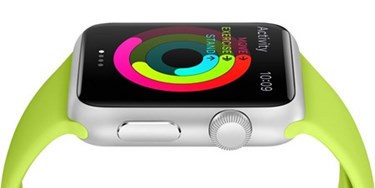AppleWatch Best For Accuracy Among Health Wearables

By Christine Kern, contributing writer

Study finds AppleWatch had 90 percent accuracy rating.
As consumers flock to the wearables marketplace in an effort to become engaged in their own healthcare and well-being, they might be well advised to do their research before purchasing a device. A new study published online by JAMA Cardiology found the AppleWatch outperformed its competitors for accuracy in measuring heart rate among health wearables. In a recent study, the Apple Watch beat out other wearable wrist technologies for accuracy in measuring heart rate, Time reports.
Researchers at the Cleveland Clinic tested the Apple Watch, Fitbit Charge HR, Mio Alpha, and Basis Peak on 50 healthy adults and compared the results to an electrocardiogram, as well as assessing a chest strap. They found accuracy ranged from about 90 percent for the Apple Watch to the low 80 percentile for the other three wearables.
“We found variable accuracy among wrist-worn HR monitors; none achieved the accuracy of a chest strap-based monitor,” the authors wrote. “In general, accuracy of wrist-worn monitors was best at rest and diminished with exercise.”
In order to read blood flow accurately, devices require good contact between the photo sensing cells and the person’s skin, according to Gordon Blackburn, one of the study’s authors and director of cardiac rehabilitation at the Cleveland Clinic. Exercising can create bounce that interrupts that contact, he said.
While using wearable to track heart rate and other activities is probably fine for healthy individuals, Blackburn cautions those with medical conditions that could worsen if their heart rate gets too high should exercise more caution.
The study also found that, as the level of activity rose, the accuracy of all the devices fell. Blackburn told Time, “What we really noticed was all of the devices did not a bad job at rest for being accurate for their heart rate, but as the activity intensity went up, we saw more and more variability. At the higher levels of activity, some of the wrist technology was not accurate at all.”
Of course, wearable manufacturers defend their devices with basic disclaimers. “Fitbit trackers are not intended to be medical devices. Unlike chest straps, wrist-based trackers fit comfortably into everyday life, providing continuous heart rate for up to several days without recharging (vs. a couple hours at a time) to give a much more informative picture of overall health and fitness trends,” Fitbit representatives said in a statement. Internal testing demonstrated accuracy ratings of 94 percent, according to Fitbit.
